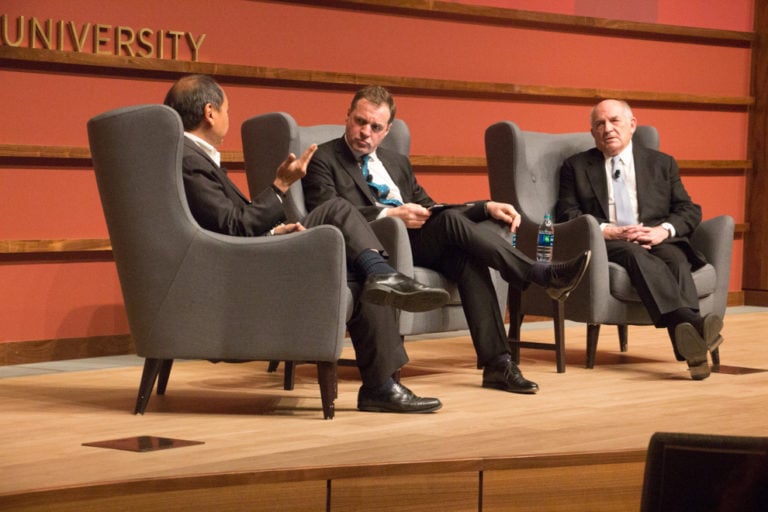In a “Notes from the Quad” blog post published Friday, Provost Persis Drell outlined a plan for the future of the Cardinal Conversations lecture series, the content and organization of which was repeatedly the subject of scandals and protest.
Among the planned changes are a reconstitution of the program’s leadership and a reevaluation of which speakers are invited to participate.
“One of the goals of Cardinal Conversations was to create a forum where thought leaders could engage in civil and intellectually rigorous conversation,” Drell said in the post before adding that there were “several bumps in [that] road.”
Among those, she elaborated, were a lack of diversity in both speakers and topics — “an issue that we tried to address later in the series” — and trouble finding a leadership structure that appropriately balanced student and faculty input.
In its inaugural year, Cardinal Conversations was co-led by Michael McFaul, director of the Freeman Spogli Institute for International Studies, and Niall Ferguson, a senior fellow at the Hoover Institution. McFaul and Ferguson worked with a committee of undergraduates representing various student groups and publications to select the roster of invited speakers.
This year, however, there will be three faculty advisors: Thomas Gilligan, director of the Hoover Institution; Deborah Rhode, Ernest W. McFarland Professor of Law; and Claude Steele, professor emeritus of psychology and dean emeritus of the Stanford Graduate School of Education.
They will work with a group of students “representing a wide spectrum of backgrounds and political perspectives” to develop lecture programming, Drell said, adding that the group structure and selection process will be determined during fall quarter.
“This committee will reexamine the program format and structure and aim to present a more diverse group of speakers and topics,” Drell said.
There were five Conversations last year, including ones featuring Palantir founder Peter Thiel ’89, political commentator Andrew Sullivan, former “Nightline” anchor Ted Koppel M.A. ’62 and former Provost John Etchemendy Ph.D. ’82.
It was the second event in the series, however — featuring social scientist Charles Murray — that sparked the most outcry. Murray, whose statements about the relationship between race and IQ have been criticized as racist pseudoscience, was met with student protest outside the lecture venue and visibly low attendance within.
The program later made national headlines after leaked emails revealed Ferguson had been coordinating with conservative student activists John Rice-Cameron ’20 and Max Minshull ’20 to steer the tone and content of the Conversations program, as well as to conduct “opposition research” on a progressive student activist.
Ferguson resigned from his leadership role after Drell was made aware of these efforts.
The new series of Conversations, under the new leadership structure, is expected to begin in early 2019, Drell said.
Contact Brian Contreras at brianc42 ‘at’ stanford.edu.
